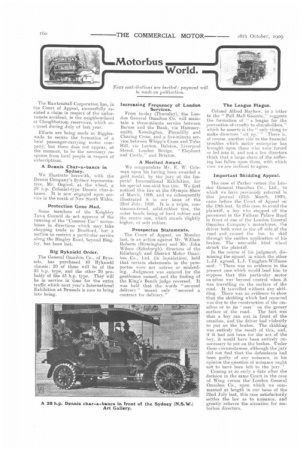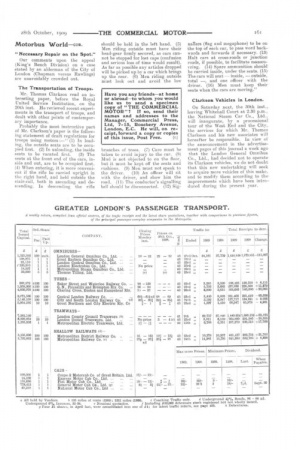Motorbus
Page 8

Page 9

If you've noticed an error in this article please click here to report it so we can fix it.
Yews contributions are invited: payment will be made on publication.
The Rawtenstall Corporation has, in the Court of Appeal, successfully resisted a claim in respect of the unfortunate accident, in the neighbourhood 01 Cloughbottom reservoirs, which cc(.1r-red during July of last year.
Efforts are being made at Biggleswade to secure the formation of a local passenger-carrying motor company, but there does not appear, at the moment, to be the necessary response from local people in respect of stsh.scriptions.
A Dennis Char-a.bancs in Sydney. We illustrate herewith, with the Dennis Company's Sydney representative, Mr. Osgood, at the wheel, a 28 h.p. Colonial-type Dennis char-abanes. It is now engaged upon service in the north of New South Wales.
Protection Gone Mad.
Some members of the Keighley TOULL Council do not approve of the running of the "Commer Car" motorbuses in directions which may take shopping trade to Bradford, but a motion to restrict a particular service itIong the Bingley Road, beyond Bingley, has been lost.
Big Ryknield Order.
The General Omnibus Co., of Brussels, has purchased 40 Ryknield chassis: 20 of these will be of the :35 h.p. type, and the other 20 probably of the 45 h.p. type. They will be in service in time for the extra traffic which next year's International Exhibition at Brussels is sure to bring into being. Increasing Frequency of London Services.
From to-day (Thursday), the London General Omnibus Co. will maintain a three-minute service between Barnes and the Bank, via Hammersmith, Kensington, Piccadilly and Charing Cross, and a five-minute service between Whipp's Cross and Tulse Hill, via Levton, Dalston, Liverpool Street, London Bridge, "Elephant and Castle." and Brixton.
A Merited Award.
We congratulate Mr. E. W. Coleman upon his having been awarded a, gold medal, by the jury at the Imperial international Exhibition, for his special non-skid bus tire. We first noticed this tire at the Olympia Show of March. 1908, and we subsequently illustrated it in our issue of the 23rd July, 1908. It is a triple, continuous-tread, solid-rubber tire, the outer bands being of hard rubber and the centre one, which stands slightly higher, of soft rubber.
Prospectus Statements.
The Court of Appeal, on Monday last, in an action against Mr. William Roberts (Birmingham) and Mr. John Wilson (Edinburgh), directors of the Edinburgh and District Motor Omnibus Co., Ltd. (in liquidation), held that certain statements in the prospectus were not untrue or misleading. Judgment was entered for the gentlemen named, and the finding of the King's Bench judge reversed. It was held that the words "secured delivery" meant only "secured a contract for delivery."
The League Plague.
Colonel Alfred Nlayhew, in a letter to the " Pall Mall Gazette," suggests the formation of " a league for the preventinn of cruelty to shareholders," which he asserts is the " only thing to make direetors .sit up.' " There is, of (-purse, another side to the financial troubles which motor enterprise has brought upon those who were forced or led into it. and not a few directors think that a large share of the suffering has fallen upon them, with which view we are inclined to agree.
Important Skidding Appeal.
The case of Parker versus the London General Omnibus Co., Ltd., to which we have previously referred in this journal (25th March. 1909), came before the Court of Appeal on the 19th inst. In this case, to avoid the plaintiff, a boy who stepped off the pavement in the Fulham Palace Road in front of one of the London General Omnibus Company's motorbuses, the driver both went to the off side of the road and caused the bus to skid through the sudden application of his brakes. The near-side hind wheel struek the plaintiff.
In the course of his judgment, dismissing the appeal, in which the other L.JJ. agreed, L.J. Vaughan-Williams said : " There was no evidence in the present case which would lead him to suppose that this particular motor on flan's was beyond control when it was travelling on the surface of the road. It Unveiled without any skidding. There was no evidence to show that the skidding which had occurred was due to the construction of the omnibus or to its user ' on the greasy surface of the road. The fact was that a boy ran out in front of the omnibus, and the driver had violently to put on the 'brakes. The skidding was entirely the result of this, and, if it had not been for the act of the boy, it, would have been entirely unnecessary to put on the brakes. Under those circumstances, although the jury did not find that the defendants had been guilty of any nuisance, in his opinion the question of nuisance ought not to have been left to the jury."
Coming at so early a date after the decision in the same Court in the case of Wing versus the London General Omnibus Co., upon which we commented at length in our issue of the 22nd July last, this case satisfactorily settles the law as to nuisance, and greatly relieves the situation for motorbus directors. "Necessary Repair on the Spot."
Our comments upon the appeal (King's Bench Division) on a ease stated by an alderman of the City of London (Chapman versus Rawlings) are unavoidably crowded out.
The Transportation of Troops.
Mr. Thomas Clarkson read an interesting paper, before the Royal United Service Institution, on the 20th inst. He reviewed recent experiments in the transport of troops, and dealt with other points of contemporary importance.
Probably the most instructive part of Mr. Clarkson's paper is the following statement of draft regulations for troops using motors:-' (1) In loading, the outside seats are to be occupied first. (2) In unloading, the inside seats to be vacated first. (3) The seats at the front end of the cars, inside and out, are to be occupied first. (-1) When entering, it is more convenient if the rifle be carried upright in the right hand, and held outside the stair-rail, both in ascending and descending. ln descending the rifle should be held in the left hand. (5) Men riding outside must have their bead-gear firmly secured, as ears cannot be stopped for lost caps (confusion and serious loss of time would result). As far as possible any articles dropped will be picked up by a car which brings up the rear. (6) Men riding outside must look out and avoid the low branches of trees. (7) Care must he taken to avoid injury to the car. (8) Mud is not objected to on the floor, but it must be kept off the seats and cushions. (9) Men must not speak to the driver. (10) An officer will sit with the driver, and show him the road. (11) The conductor's signalling bell should be disconnected. (12) Sig
milers (flag and megaphone) to be on the top of each car, to pass word backwards and forwards if necessary. (13) Halt cars at cross-roads or junction roads, if possible, to facilitate manoeuvring. (14) Spare ammunition should be carried inside, under the seats. (15)The cars will seat inside, outside, total -, and one officer with the driver. (16) Men must keep their. seats when the cars are moving."
Clarkson Vehicles in London.
On Saturday next, the 30th inst., leaving Whitehall Court at 2.30 p.m., the National Steam Car Co., Ltd., will inaugurate, by a processional tour of the West End and the City, the services for which Mr. Thomas Clarkson and his new associates will hereafter be responsible. In view of the announcement in the advertisement pages of this journal a week ago that the London General Omnibus Co., Ltd., had decided not to operate its Clarkson vehicles, we do not doubt that this new undertaking will seek to acquire more vehicles of this make, and to modify them according to the improvements which have been intro(luced during the present year.






















